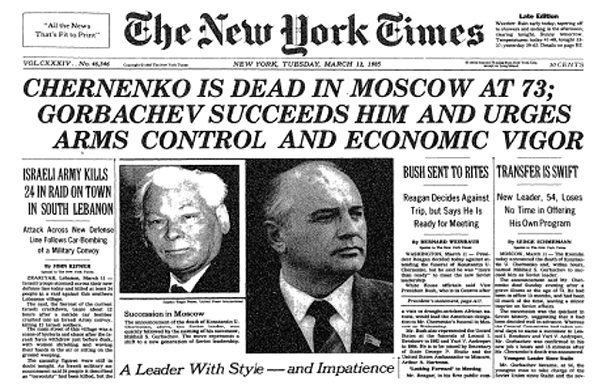1985 : Gorbachev rises in USSR
MOSCOW, July 3, 1985 — Never in postwar history has a Soviet leader moved so fast to consolidate his control of Kremlin power. When the position of President was given Tuesday to someone other than Mikhail S. Gorbachev, the Communist party leader, Soviet citizens and Westerners alike immediately assumed that this was a sign of Mr. Gorbachev's strength, not weakness.
Since 1977 Soviet leaders have collected for themselves both the nation's top titles, party General Secretary and President. But in nominating the longtime Foreign Minister, Andrei A. Gromyko, to the job, Mr. Gorbachev said he would simply be too busy to handle the largely ceremonial duties of head of state.
Mr. Gorbachev, 54 years old, took power on March 12, bringing a long-awaited shift from the older generation of leaders who had clung to power for the last decade. Reports have accumulated in Moscow that the transition was not an easy one, and that the old guard raised stubborn resistance at the party meeting that elected him.
This week's events demonstrate that the resistance has been crushed, and that Mr. Gorbachev now has full control of the men at the top echelon of Soviet power. None of his predecessors could have said that so soon after taking office.

Since coming to power, Mr. Gorbachev had added four allies to what is now a 13-man Politburo, the nation's decision-making council, and three to the 11-member Secretariat of the Communist Party Central Committee.
In the last two days, in addition to shifting Mr. Gromyko, 75, and naming Eduard A. Shevardnadze, 57, to both the Politburo and the job of Foreign Minister, the Soviet leader dismissed the man who had been seen as his chief rival among the younger Politburo members, Grigory V. Romanov, the former Leningrad party chief.
Given the pace of his personnel moves, stunning by Soviet standards, many Soviet and foreign observers now expect him to make further changes no later than next February at the 27th Communist Party Congress. Often mentioned among the men who may leave the scene are Prime Minister Nikolai A. Tikhonov, 80, and the Moscow party chief, Viktor V. Grishin, 70.
Mr. Gorbachev's decisions, in true Kremlin style, have been made in secret and announced publicly only to the accompaniment of a unanimous show of hands at the nation's pro-forma parliament, the Supreme Soviet.
But in Soviet terms, his style is open and charismatic, and he has taken pains in television appearances both to court public opinion and to demonstrate that he has the backing of the people for the limited reforms he advocates.
''We count on your support,'' he called, smiling, to an enthusiastic group of people he met last week on a street in Kiev.
''Keep up the good work!'' the people shouted back.
Though Mr. Gorbachev has moved quickly to consolidate control, Western diplomats say the hardest part might still lie ahead: a battle with the entrenched and conservative middle level of the Soviet bureaucracy.
The party secretaries in the Soviet Union's cities and regions, all-powerful in their scores of dukedoms, formed the mass of support for the conservative leadership of Mr. Gorbachev's predecessors, and he must either convert or remove them if he is to succeed.
It is to these men that Mr. Gorbachev's television pitch is addressed, as he tries to emphasize that not only the political leaders above them but the masses of people below are with him, and that the tide of Soviet history is flowing his way.
In his Kremlin moves and in the television appearances in which he both cajoles and threatens, he has demonstrated the aptness of Mr. Gromyko's description of him in a speech in March supporting his ascent to leadership: ''Comrades, this man has a nice smile, but he has iron teeth.''
Nowhere was this trait more evident than in his shift of Mr. Gromyko, a move described by one Western diplomat as ''an elegant solution'' that allowed him to award a supporter while apparently taking control of foreign policy for himself.
Mr. Shevardnadze, named in Mr. Gromyko's place, is a party leader from Soviet Georgia with virtually no foreign policy experience, but a man very much of Mr. Gorbachev's own style - young, energetic and tough. Western diplomats saw the appointment as offering Mr. Gorbachev a chance to open a new chapter in Soviet foreign policy, if he so chooses, after Mr. Gromyko's 28-year tenure.
Immediately after making the change, Mr. Gorbachev demonstrated his readiness to move ahead with foreign policy, announcing today his first visits to the West as Soviet leader - to Paris in October and to Geneva for a summit meeting with President Reagan in November.
The announcements foreshadow a more active foreign policy than the Soviet Union has seen since the mid-1970's, a period of ailing leaders, a Western diplomat suggested.
''When Gorbachev arrives in Paris and Geneva, a new team will be appearing on the world's doorstep,'' the diplomat said.
Copyright The New York Times